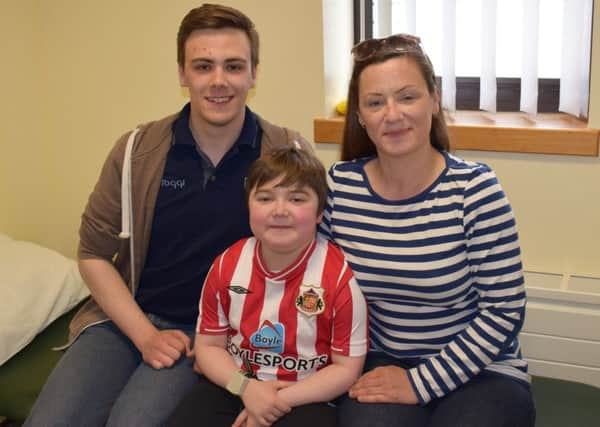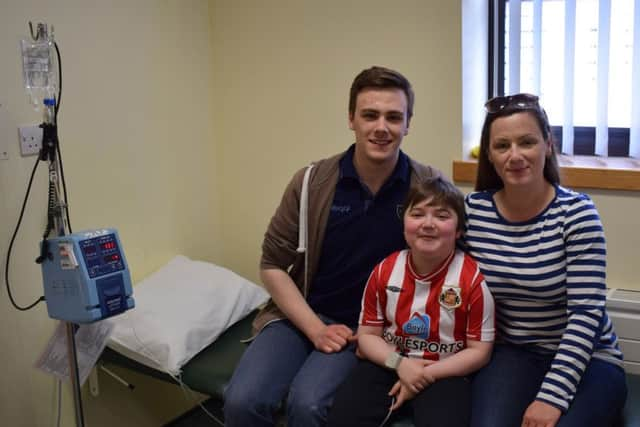Pioneering treatment offers new hope for Sunderland schoolboy Pascal


Pascal Johnston was just four-years-old when he was diagnosed with Duchene Muscular Dystrophy (DMD), a genetic condition which causes progressive weakening of the muscles.
Now the 14-year-old is taking part in a clinical trial which aims to delay the onset of symptoms and extend the lifespan of sufferers.
Advertisement
Hide AdAdvertisement
Hide Ad

DMD is a severe form of muscular dystrophy, prevalent in boys and caused by a faulty gene. Sufferers lose muscle cells and, without treatment, tend to lose the ability to walk around the ages of eight to 10.
Eventually the muscles of the heart and lungs begin to fail and, without clinical intervention, boys typically only live into their late teens or early twenties.
Pascal and his family were approached to take part in the trial - carried out by Newcastle upon Tyne Hospitals NHS Foundation Trust and Newcastle University - just over a year ago.
“We were approached by the consultant from the RVI, Dr Michela Guglieri, and she explained a bit about what the trial was hoping to achieve and that Pascal would be able to take part,” said Linda.
Advertisement
Hide AdAdvertisement
Hide Ad

“Michela sent both me and Pascal information about the study. The information was really clear and was written in such a way that I and Pascal could understand what was involved.”
Pascal agreed: “Yes it was all very clear and easy to understand from the beginning,” he said.
After a further meeting with registrar Alex Murphy the family decided to go ahead with the trial.
“Pascal has a diagnosis of DMD and is aware that it is life-limiting, however, you always have hope as a mam,” said Linda.
Advertisement
Hide AdAdvertisement
Hide Ad“I was told when he was four that he probably wouldn’t reach 14-years-old.
“After the diagnosis we spoke to consultants at the Centre for Life who were more in the know about DMD, and were told that medical science is moving fast and that there are a lot of exciting things coming up.
“They didn’t want to give us false hope but said things are in the pipeline, and sure enough 10 years down the line, Pascal is on a drugs trial.
“I’d heard and read about other boys being on trials but Pascal hadn’t been compatible for them. I wouldn’t say we were playing a waiting game, because you can’t sit and think ‘I wish something would come along,’ as you have to live your life and enjoy it and to make things the best you possibly can for Pascal.
“And then this golden opportunity came along.
Advertisement
Hide AdAdvertisement
Hide Ad“We had to weigh up the pros and cons and to know that it was as safe as safe can be. We were going into the unknown, along with the doctors, and Pascal had to come first.
“So for my part, as Pascal’s mam, it gives me hope. It’s not a cure but it’s hope.
“I discussed with Pascal that it may well be that at the end of the trial, this particular trial anyway, they might not achieve what they hope to achieve, however, it won’t be a disaster because it will advise and steer them in other directions and to try other things.”
The trial involves Pascal visiting The Royal Victoria Infirmary every Thursday afternoon for the drug treatment, as well as periodical visits to the Freeman or Newcastle University’s Campus for Ageing and Vitality for MRI scans, heart monitoring and various other things.
Advertisement
Hide AdAdvertisement
Hide AdPascal’s brother Lawrence said: “I’d definitely recommend to anyone to go into clinical research as a participant, it’s really good.
“As said, there is a chance that this trial may not be 100% successful but this could lead to something that is a medical breakthrough - this could be step one of a cure or a permanent plaster over the deletion.”
Pascal added: “I find it interesting and nice to meet other people who are on this trial and the doctors are really nice as well.”
*The Newcastle upon Tyne Hospitals NHS Foundation Trust is the country’s top performing trust for volume of clinical research for the fifth year running.
Advertisement
Hide AdAdvertisement
Hide AdThe 2015/16 NIHR Research Activity League Tables, published today by the National Institute for Health Research (NIHR) Clinical Research Network (CRN), show all NHS trusts in England are delivering clinical research, providing thousands more patients with access to better treatments and care.
Over half of Trusts and Clinical Commissioning Groups (CCGs) across the country increased the number of clinical research studies undertaken last year.
The Newcastle Trust delivered 514 clinical research studies during the last year, a rise of 28 from the previous year, and 12,122 patients took part.
Chief executive Sir Leonard Fenwick said: “We’re thrilled to be leading the way nationally in clinical research once again.
Advertisement
Hide AdAdvertisement
Hide Ad“If it wasn’t for the continued hard work and dedication from our team of medical professionals we wouldn’t be able to achieve all that we do in the clinical research field. Special recognition also has to go to all of the patients across the region who give their time to enable us to carry out this important research.
“Without them, none of this would be possible.”